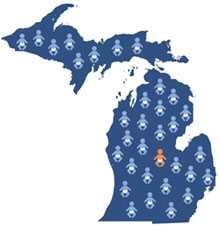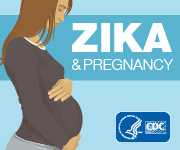Birth Defects Tracking in Michigan
Michigan Birth Defects Registry

1 in 33 babies born in Michigan has a major birth defect.
The Michigan Birth Defects Registry (MBDR) is essential for understanding the impact of birth defects in the state. The registry tracks babies born with birth defects, conducts research about the causes of birth defects, and connects families of children with birth defects to local support.
Common. Costly. Critical.
- Among the 115,000 babies born in Michigan each year, about 1 in every 33 is diagnosed with a birth defect.
- Birth defects are costly – hospital costs for the treatment of birth defects are more than $2.5 billion each year in the United States.
- Babies born with a birth defect are more likely to die before their first birthday, compared to babies born without a birth defect.
About the Program

The MBDR is a statewide system that collects information about babies born with birth defects in Michigan. One of 14 birth defects programs that receive a grant funded by CDC’s National Center on Birth Defects and Developmental Disabilities, the MBDR monitors about 115,000 live births in Michigan each year.
The MBDR was established more than 20 years ago to track birth defects, other serious inherited medical conditions, and some developmental disorders. It works with other state programs to help provide access to health services for children with special healthcare needs.
The MBDR works to:
- Collect and analyze information on babies born with a birth defect in Michigan to identify trends over time and potential causes
- Respond to community concerns
- Make sure that children with special healthcare needs and their families have access to healthcare services
- Provide information and services to keep mothers healthy before and during pregnancy to help prevent birth defects
Program in Action
- Prevents birth defects: Folic acid is a B vitamin that can help prevent birth defects of the brain and spine, called neural tube defects. Over the last ten years, MBDR worked with March of Dimes and other partners to provide more than 40,000 bottles of folic acid to low-income women to help prevent neural tube defects.
- Educates healthcare providers: The MBDR helps provide and promote training for health professionals to help prevent birth defects and care for children with birth defects. For example, the MBDR has created a provider toolkit about diabetes during pregnancy as a risk factor for birth defects.
- Promotes preconception care: The MBDR has developed bilingual preconception education materials for women of Michigan’s large Arab community.
- Investigates community concerns: The MBDR investigates concerns about the occurrence of birth defects, such as gastroschisis (a serious defect of the abdominal wall), and congenital heart defects.
- Collaborates with partners: The MBDR is working with the state newborn screening program to begin screening newborn babies for .
- Educates stakeholders about birth defects in Michigan: MBDR’s hospital referral guide and toolkit are available to discharge planners, care coordinators, and primary providers. In addition, the registry provides print materials and web-based resources at no charge to local providers, community health, and the public.
Making a Difference
“When my daughter was born with a critical congenital heart defect (CCHD), it really opened my eyes to not only the importance of screening for these defects, but also taking this information and applying it to further medical technology. Data on CCHD collected by the Michigan Birth Defects Registry shows how many families are impacted by CCHD. Having the data to help the medical community figure out what causes these defects and how to prevent them is priceless.”
– Michigan mother of a child with a critical congenital heart defect
More Information
For more information on the Michigan Birth Defects Registry, please visit their website or call 1 (866) 852-1247.
- Page last reviewed: May 16, 2016
- Page last updated: September 21, 2016
- Content source:



 ShareCompartir
ShareCompartir